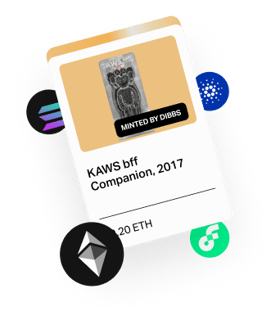Top 4 NFT Use Cases in Documentation Management and Verification
Explore how NFTs are revolutionizing document management across various sectors by providing an immutable, traceable, and secure record of provenance.

As the digital revolution became more widespread, businesses started digitizing documents to improve efficiency, reduce costs, enhance security, and promote sustainability. But it also brought new challenges with it. For example, it’s difficult to track ownership history of digital documents and verify their authenticity.
NFTs solve these problems. In this article, we’ll look at the record-keeping problems associated with digital documents in different spaces and how tokenizing documents into NFTs addresses these issues.
Subscribe to get our best content in your inbox
By clicking “Submit” you agree to Dibbs
Privacy Policy and
consent to Dibbs using your contact data for newsletter purposes.

Business Records
Managing contracts and other significant documents like invoices is crucial for operational efficiency and significant cost savings. However, businesses often face hurdles in this process.
For starters, it’s challenging to identify who should receive payment for an invoice or service especially if there are multiple contractors or service providers involved as each party may have a different stake based on the services they provided. And if businesses don’t accurately track and record the flow of funds, there will be disputes, errors, and inefficiencies in the payment process.
Another challenge that businesses face is the tracking and duplication of derivative documents like consolidated invoices. Since derivative documents are based on other documents, it can be challenging to trace back its original source and verify its authenticity.
Tokenizing documents into NFTs offers a unique solution to these problems. Since each of them carry a clear record of provenance, it’s easy to determine the original source of a derivative document.
They also indicate the rightful recipient of the associated funds, which ensures clarity in ownership and allows the business to direct the payment to the rightful recipient, eliminating manual interventions and errors.
Educational Records
Educational Records
The education sector faces a significant challenge due to fake credentials. According to a report by The Washington Post, approximately 2,800 individuals managed to obtain their credentials without attending the required classes. This threatens the integrity of academic institutions and undermines trust in educational qualifications.
NFTs present a solution to this problem — whenever a student earns a digital certificate or diploma, it’s tokenized and stored on a blockchain. This enables educational institutions to create digital certificates or diplomas that are authentic and easily verifiable. Additionally, NFTs are immutable and traceable, making it extremely difficult for malicious actors to tamper with the records and alter grades.
Healthcare Records
Healthcare Records
Healthcare data breaches have become a significant concern in recent years. According to the HIPAA report, between 2009 and 2022, there were over 5,150 healthcare data breaches involving 500 or more records, exposing an astounding 382 million healthcare records. This surge in breaches has jeopardized patient privacy and placed immense pressure on healthcare providers to ensure data security and compliance.
Once a healthcare record is stored as an NFT on the blockchain, it cannot be altered, duplicated or forged due to its immutability. And with the integration of smart contracts, it’s possible to set data access permissions so only authorized personnel can view records.
Additionally, the decentralized nature of blockchain means there's no single point of vulnerability, significantly reducing the risk of large-scale data breaches and unauthorized access to sensitive information.
Legal Documentation
Legal Documentation
As legal procedures increasingly move to digital platforms, distinguishing between an original document and its copy becomes less clear-cut. When a document is converted to a PDF, electronically signed, and then shared, both the sender and recipient could end up with what seems to be the "original" document. This lack of clarity causes legal issues, particularly when the authenticity of a document comes under scrutiny.
In addition to this, there’s a rise in malicious activities like the forgery of documents which lead to disputes when it comes to real estate ownership.
NFTs offer a groundbreaking solution to this conundrum. Unlike traditional digital files, an NFT has a unique identifier and a transparent record of ownership. So, if a legal document, such as a trust deed, is tokenized as an NFT, the ledger will clearly indicate the holder of the original, resolving any ambiguities.
Challenges Associated With Tokenizing Documents into NFTs
Challenges Associated With Tokenizing Documents into NFTs
While the benefits of tokenizing documents into NFTs are clear, businesses may face several challenges in the process of adopting this new technology.
Technical complexityTechnical complexity: The process of tokenizing documents into NFTs requires a certain level of technical expertise. Businesses need to understand blockchain technology, smart contracts, and the specifics of creating and managing NFTs. This might necessitate hiring new staff or training existing employees, which can be costly and time-consuming.
Regulatory uncertaintyRegulatory uncertainty: The lack of clear guidelines and standards for NFTs can make it difficult for businesses to ensure they are operating within the law. So, businesses may face legal and compliance issues, especially in sectors like healthcare and finance where data privacy and security regulations are stringent.
Interoperability issuesInteroperability issues: NFTs are typically tied to a specific blockchain platform, such as Ethereum. And the lack of interoperability between different blockchain platforms can pose challenges. For instance, if a business wants to switch to a different blockchain in the future, it might face difficulties in transferring its NFTs.
Public perception and adoptionPublic perception and adoption: While NFTs are gaining recognition, they are still a relatively new concept for many people. So, businesses may face challenges in getting their stakeholders such as employees, customers, and partners to accept the use of NFTs. This could slow down the adoption process and limit the effectiveness of tokenizing documents into NFTs.
NFTs: The Future of Record-Keeping
NFTs: The Future of Record-Keeping
By providing an immutable, traceable, and secure record of provenance, NFTs can significantly enhance the integrity and efficiency of document management, thereby fostering trust and transparency. However, the journey towards widespread adoption is not without its challenges.
These include the technical complexity of blockchain technology, regulatory uncertainties, interoperability issues between different blockchain platforms, and the need for broader acceptance and understanding of NFTs among stakeholders.
But by fostering a culture of innovation, businesses can drive the acceptance and understanding of NFTs and pave the way for a future where document management is secure, efficient, and transparent. Dibbs aids in this approach — it helps you tokenize your documents into NFTs and create a streamlined record keeping system. To learn more about how Dibbs helps you organize files, schedule a demo.

Ben Plomion
Ben Plomion is Dibbs' Chief Marketing Officer. As a child, Ben collected comic books and Panini Football stickers. Now, Ben's PC consists of physical-backed NFTs.

